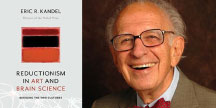|
|
||||||||
艺术与科技 |
|
Multi-perspecties: Art with Science and Technology |
|
|
|
.
|
|
库伯高等科学艺术联盟学院 (The Cooper Union School of Art) 学术报告 |
|
Art and The Brain 艺术与大脑 NOBEL PRIZE-WINNER ERIC R. KANDEL DISCUSSES ART AND THE BRAIN 诺贝尔奖获得主 Eric R. Kandel 关于艺术与大脑的讲演 Eric R. Kandel will discuss and sign copies of his latest book, Reductionism in Art and Brain Science, in a free, public lecture. In the book, Dr. Kandel demonstrates how science can inform the way we experience a work of art and seek to understand its meaning. He illustrates how reductionism—the distillation of larger scientific or aesthetic concepts into smaller, more tractable components—has been used by scientists and artists alike to pursue their respective truths. Dr. Kandel draws on his Nobel Prize-winning work revealing the neurobiological underpinnings of learning and memory in sea slugs to shed light on the complex workings of the mental processes of higher animals. He demonstrates through bottom-up sensory and top-down cognitive functions how science can explore the complexities of human perception and help us to perceive, appreciate, and understand great works of art. Kandel explains how, in the postwar era, Pollock, de Kooning, Rothko, Louis, Turrell, and Flavin used a reductionist approach to arrive at their abstract expressionism and how Katz, Warhol, Close, and Sandback built upon the advances of the New York School to reimagine figurative and minimal art. Eric R. Kandel is University Professor and Kavli Professor in the Departments of Neuroscience, Biochemistry and Molecular Biophysics, and Psychiatry at Columbia University. He is director of the Kavli Institute for Brain Science and co-director of the Mortimer B. Zuckerman Mind Brain Behavior Institute at Columbia. In 2000, he was awarded the Nobel Prize in Physiology or Medicine. By TAGS, www.eventbrite.com |
|
. |
|
| . | |
| . | |
|
|
|
|
||||||||
本网站里所有网页设计的版权属纽约"中华文化艺术网" eChinaArt.com, Inc. 所有,文章、艺术作品照片版权属艺术家或作者本人所有。任何未经版权所有人许可的转载, 出版或借用都将被追究法律责任。eChinaArt.com,Inc© |
||||||||
